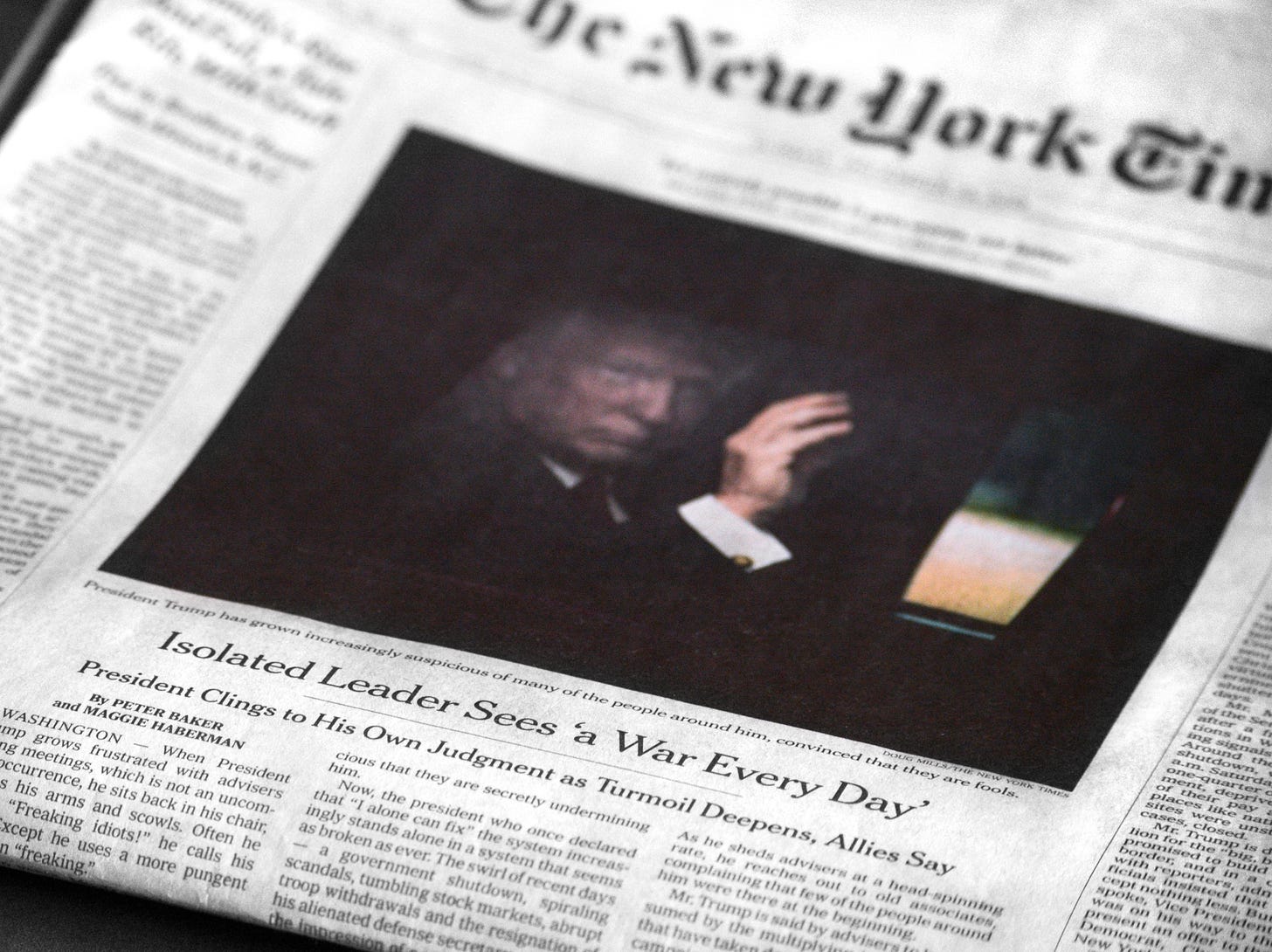Dan Froomkin on the state of political journalism
"They have not pointed out that the Republican Party has no agenda at this point but to obstruct the government and flood the zone with shit."
This work is entirely reader supported. I’m offering a holiday special for new subscribers. Click the link below to to sign up for one year of full access to Public Notice for just $40, or less than a cup of coffee each month.
Dan Froomkin’s Twitter bio says “I afflict comfortable journalists.” It’s an accurate self-description.
Froomkin is editor of Press Watch, a publication whose tagline is “an intervention for political journalism.” His no-punches-pulled media criticism comes as close as anything to filling the void created by Eric Boehlert’s untimely passing earlier this year. We all understand the toxicity of Fox News, but Froomkin and Press Watch do important work holding prestige outlets like the New York Times and Washington Post accountable as well.
Case in point — Froomkin’s most recent post takes the Times’ Peter Baker to task for soft-pedaling Trump’s recent Mar-a-Lago dinner two antisemites. He writes:
Baker ends by quoting yet another Republican political strategist posing the question of whether Trump is just pretending to adhere to fringe conspiracy theories, or whether he’s actually bought in.
That’s a stupid question. My question is: What more will it take for journalistic institutions like the Times to acknowledge that what Trump is saying requires condemnation, not speculation.
With Trump officially running for president again, Public Notice talked to Froomkin last week about how political journalists are falling short in covering an increasingly extreme GOP, the “truth sandwich,” why he’s especially worried about Ron DeSantis, and more.
A transcript of the discussion, lightly edited for clarity and length, follows.
Thor Benson
How are you feeling about the state of Trump coverage these days? Are you seeing a repeat of mistakes from 2016 and to a lesser extent 2020, or have lessons been learned?
Dan Froomkin
A bit of both. Journalists certainly aren’t dwelling on his every word as much as they used to, and towards the end of his presidency they finally got much more comfortable about calling out his lies and calling them lies. But there are still problems.
A good example is actually the underreaction to Trump’s recent statement about being willing to terminate the Constitution. It’s important to keep track of when Trump makes a significant contribution to the narrative that he is dangerously anti-democratic and criminal. Substantial movement in that direction is big news.
That statement about subverting the Constitution was more disqualifying than anything else he has said before, which is amazing because he actually tried to steal the election. You can’t run for president — where you have to promise to uphold the Constitution — if you don’t support the Constitution.
It also shows how the Republican Party’s lip service to the Constitution is a sham. It’s misdirection. They use the Constitution as an excuse to do things that are unconstitutional, but they don’t say that. Now Trump’s said it.
Thor Benson
I didn’t see as much coverage of Trump’s statement in big papers as you would if a foreign leader said something similar.
Dan Froomkin
That’s a good litmus test. To the media’s credit, some journalists have tried to establish whether Republicans are still supporting Trump or not. But even then, they’re wishy-washy. There was an article in the New York Times that basically said there was a bipartisan critique of Trump’s statement on the Constitution, but in fact, the story was about how few Republicans were willing to say that.
This is very important: When Trump says something beyond the pale of normal standards, reporters should absolutely be demanding to know whether leading Republicans are endorsing it, because by not saying anything they’re enabling him.
Thor Benson
We probably shouldn’t cover everything he says, which happened too much during Trump’s first presidential run, but you also don’t want to ignore his really extreme statements.
Dan Froomkin
Right. The key is how you present it. You don’t do it by saying, “Trump said this,” and then four paragraphs later include some reaction to it.
A good example of how you do it is the “truth sandwich.” You start off by saying the job of the president is to uphold the Constitution, so Trump’s offhand comment that he would subvert it seems like evidence of his inability to do the job. Then you get to the reaction and note that Republicans aren’t saying anything.
There are ways of covering Trump that aren’t just giving him the microphone, which was the huge problem in 2016.








